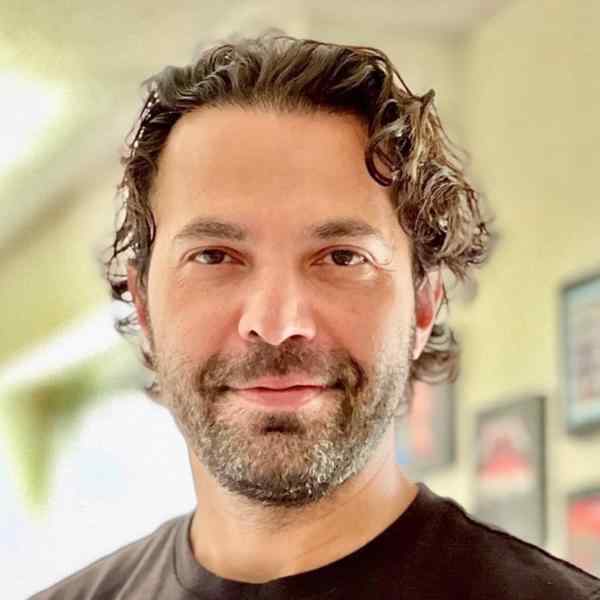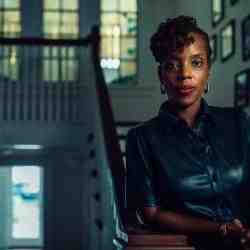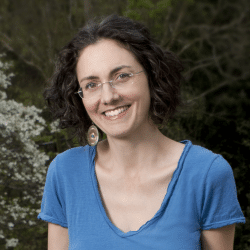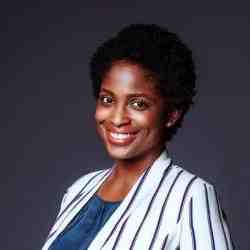Introduction
Edward Edilbi is introducing a new way to empower, integrate and build social capital in scattered, immigrant populations that have been affected by a political crisis or natural disaster. Using diaspora networks, he enables refugees to play an active and productive role, thus changing their status from helplessness to independence and promoting positive perceptions of refugees.
The New Idea
Edward is reversing the situation for refugees from being in a state of total helplessness and disempowerment to one of empowerment and productivity through harnessing and building social capital, connectivity, trust, willingness to share, and empathy. He is changing post-conflict communities from an individualistic mentality focusing only on survival to one that is fostering supportive relations based on solidarity.
Focusing on the current post-conflict Syrian refugee community and diaspora around the world, Edward is creating a complex network of individuals, connected to regional hubs and to each other, who recognize their own capital and talent and have a will to help their peers. Instead of traditional aid to refugee communities that only provide short-term solutions and prolong dependency, Edward’s work creates a cycle of support between diaspora and refugees and fosters long-term empowerment. Using online and offline strategies, he provides real-time support and solutions to connect Syrian refugees with housing, employment, education, legal advice, investment opportunities, emotional support and a cultural understanding of their host country.
Regaining their self-confidence and becoming financially independent, refugees are able to be active and contributing members of their communities, thus changing the negative perception and stereotype that refugees are a burden and only bring problems to a community. This transition opens the doors for unity, constructive exchange, and channels of mutual support.
Edward has plans to replicate his work, which already spans across 36 countries that have large communities of Syrian refugees, to other geographical areas and communities beyond Syrians that have suffered from post-disaster displacement.
The Problem
The prolonged Syrian political conflict and its resulting violence, destruction, devastation and armed assaults, have forced 8 million Syrians to flee their homeland, most taking only their personal savings and leaving behind their professional careers, education, families and homes. Displaced Syrians have travelled to several countries around the world, with a significant number in the Arab countries of Egypt, Jordan, Lebanon, Saudi Arabia, Iraq and Turkey.
Many Syrian refugees are currently living in extremely precarious and difficult conditions, finding themselves homeless and jobless. Furthermore, Syrian refugees are finding themselves feeling very isolated and in a state of survival mode, causing stress, psychological and economic problems to both themselves and their host communities.
Most displaced Syrians have never been to the countries which they have fled to and are consequently not acquainted with the new culture, customs, and context, causing it to be very challenging to start a new life. Everything from knowing the legal status of their stay to finding housing and income generating activities can be extremely challenging. Complicating the situation, there has been an increase in levels of illegal immigration of Syrian refugees primarily due to a lack of knowledge and awareness when choosing which country to migrate to and which may present the best and safest opportunities. Illegal immigration has led to the dislocation of many families, leaving many refugee children homeless and unaccompanied.
A large number of Syrian refugees are concentrated in neighboring Arab countries, many of which already have their own economic and social challenges. In these countries, many Syrians have found it difficult to integrate economically and as a consequence, Syrian populations put pressure on the resources of their hosting countries without actively contributing to the economy. This has led to much intolerance and stereotyping among the citizens of the hosting communities.
On average, a Syrian refugee spends three months depending only on his or her personal savings to cover basic life necessities in a country that he or she has newly arrived in. Many refugees surrender to a state of depression, not knowing where to go, what to do, how to act or how long they will remain with no sources of income to sustain themselves and their families. This state of being contributes to a very individualistic way of living, only thinking about oneself because basic life necessities are not being met.
Additionally, receiving direct financial aid from different humanitarian organizations often increases refugees’ sense of dependency, frustration and inadequacy as they are unable to support themselves and their families.
The Strategy
Seeing the disempowerment and dependency of the Syrian refugees, Edward started working on his idea in the winter of 2012 with a goal of empowering Syrian refugees through building social capital. By February 2013 he launched Dubarah, an Arabic word meaning “solution.” Initially wanting to find a way to provide job opportunities for Syrian refugees, Edward started the organization with a web platform, which received 3,000 hits during the first hour of launch—with no paid advertisements. With this success and the knowledge Edward gained about other needs of Syrian refugees, Dubarah evolved into a major web portal linked to six major social media channels with 660 on the ground Syrian Diaspora volunteers, spread across 36 countries around the world with a particular focus on Arab neighboring countries to Syria like Egypt, Lebanon, Jordan and Saudi Arabia. Edward quickly recognized that an online portal would not be enough to connect with all Syrian refugees and began forming an offline strategy that taps into the human capital of the Syrian diaspora all over the world.
Dubarah started with an initial team of eight Syrian diaspora all in different countries. These eight country leaders were first tasked with forming their own teams and beginning the marketing of Dubarah in the countries they lived in. In just four months, Edward recruited a core team of 15 members—all supported by funding from grants and individual donations—that carry out the strategy and operations of Dubarah including marketing, communications, web design, partnerships, and volunteer management.
Key to Edwards’s strategy was finding a way to easily engage with and retain the audience. Drawing upon his expertise in advertising and creative communications, Edward created cartoon male and female characters, “Dubarji,” a name taken from the word Dubarah that translates to the “person ready to provide the solution.” All communications through the website are integrated with the Dubarji characters, all of which have a Syrian dialect and use appealing comments that encourage Syrian diaspora to become solution providers or Dubarjis as well as Syrian refugees to become involved. Edward recognizes that messages such as “I have your Dubarah” meaning “I have your back” can be some of the most healing and empowering words for a refugee to hear.
The first endeavor that Edward and his team of Dubarji undertook was to create a series of manuals titled, “The Foreigner’s Guidebook.” These guidebooks are a comprehensive resource for every Syrian refugee immigrating to a country for the first time, including legal statuses for staying, types of visas a refugee can obtain, lifestyle and culture, accommodation options, living expenses, means of transportations and necessary address that refugees may need, such as governmental institutions. In the span of eight months, 1,800 Syrian diaspora members around the world participated in producing content for these guidebooks which were then distributed to 300,000 Syrian refugees in 36 countries.
Recognizing the many needs of refugees, Edward began to expand the web platform to include various portals to help refugees with finding a job, accessing capital, housing, educational opportunities, and emotional well-being. Relying on the 1,800 diaspora volunteers, and their networks, all refugees’ needs are met.
Dubarah’s primary portal is for employment opportunities. Edward launched a global campaign directed at Syrian diaspora businessmen, entrepreneurs and investors under the title of “employ/partner with a Syrian refugee”. The campaign was to either encourage Syrians to employ at least one Syrian refugee in their companies or invest in a Syrian refugee start-up. In parallel, Edward launched an employment portal which displays opportunities within Syrian Diaspora firms or other vacancies in the refugees host countries. Within a few months of opening the job portal, 8,000 opportunities were posted, 4,000 of which were quickly filled by Syrian refugees. Additionally, Edward launched an initiative to provide career counseling, job advice, and coaching as a means to help both job seekers and employees increase their capacity.
Based on the needs expressed by Syrian refugees engaged through Dubarah, Edward's web platform further evolved to include an investment portal for Syrian refugees and Syrian diaspora members with capital to invest. Through the portal they can partner, exchange knowledge and expertise, as well as find other investment opportunities in the countries where they reside. In less than a year, 420 funding opportunities and 560 partnership opportunities have been realized through the investment portal. Further, the portal provides strategic and technical assistance for Syrian start-ups. Within a few months of starting the investment portal, Dubarjis were able to offer business consultations to 175 start-ups from the refugee community.
Two additional portals include housing and education. Syrian diaspora can post housing openings, call for roommates or list apartments that can be rented to refugees. The education piece consists primarily of scholarship opportunities and access to informal education.
In every host country there is a demand to handle critical refugee cases. Edward has created teams which provide humanitarian aid, what he calls the ‘Emergency Relief Team’, who intervene in very limited cases where a refugee may have lost his home or job and requires immediate presence of on-the-ground support. This team is now composed of an additional 1,850 Syrian diaspora across the world ready to offer emergency support.
On top of all the opportunities presented to Syrian refugees, Edward is concerned with the psychological wellbeing of refugees, including their self-perception. An integral part of his social network is showcasing successful innovations of Syrian diaspora around the world to demonstrate to the refugees that they too possess the potential to innovate and succeed. For example, the team encouraged a Syrian young woman to channel her sculpting talent into the creation unique shaped desserts. With the help of local Dubarji, the woman was able to start a new micro-enterprise that generates other job opportunities. This part of Edward’s idea is under the portal of “innovations in expatriation” within the Dubarah platform.
The surrounding environment, especially the relationship and interaction between Syrian refugees and the local citizens of every host country is an extremely important and in refugees’ inclusion. To fight stereotypes and stigma against refugees, Edward created the “Million Thanks” campaign. It involves mobilizing volunteers of refugees to interact with local community members and distribute brochures that explain the reasons behind the presence of refugees in their community. The campaign serves as a way to thank the local community as well as an effort to show that the refugees are willing to be active agents in the community. In the first four countries that the campaign was started in, immediate improvements were seen between the relationship between the refugees and other citizens, including decreased rent rates for refugees and further collaborations. Edward is working to also direct the “Million Thanks” campaign to government officials and decision makers in hosting countries to advocate for the rights of Syrian refugees.
In just one year, Dubarah impacted 250,000 Syrian refugees around the world, with an average of 500 solutions and consultations provided per day with a total of 25,900 opportunities secured between jobs, investments, start-up advice, housing, legal consultations, and educational opportunities. Approximately 100 people on average register daily to the web platform, adding yet more individuals to Dubarah’s growing network.
Edward’s next step is to launch a mobile application linked to the online Dubarah platform for easier accessibility. He is also working to enhance the performance of his platform through establishing a directory for Syrian professionals, whereby everyone can have a complete profile on the social network listing their profession and possible support areas. This feature will make it easy to run a quick search in order to connect people in specific areas more efficiently.
Edward’s long term plans include replicating the Dubarah model to empower post-conflict or natural disaster immigrant communities.
The Person
Having been encouraged by his parents to be self-motivated and independent, Edward learned to work hard from a young age and became financially independent at the age of 16. In school he was known for being a leader and launching initiatives. One initiative that he launched was creating a school library. Recognizing that this was a critical need, he gathered contributions from other students at the school and with the donations was able to start the school’s first library—an accomplishment that was even recognized by the Syrian Ministry of Education.
Edward pursued a degree in Mass Communications at the University of Damascus, Syria and used this degree to further his interests in visual communications and branding. During his time at the university, Edward became one of the pioneers of the Syrian blogging community and also co-founded an organization to promote the use of Arabic language and identity in designs and calligraphy. Edward’s educational background sparked an interest in connecting large communities with commonalities to empower each other. Taking a job in a mobile communications company after graduating, he pitched the idea to his supervisor and was then invited to set up a system that connected the company’s entire client base to each other and build a platform where the clients could share knowledge, experience, and ideas.
When the Syrian conflict broke out, Edward was married with three children. He lost all his belongings, beginning with his home and car. Similarly, his brother lost his medical care center. Edward’s life took a drastically different turn when he had to leave Syria and was separated from his family. Having lost his home, Edward moved to Dubai, United Arab Emirates to find a suitable job opportunity, while his wife, children and members of his extended family moved to Lebanon and a brother to Turkey.
In Dubai, Edward found he was not alone in his search for a job and for purpose. Many of his friends, business owners whom he worked with before and other contacts were in the same state of confusion and depression. It took Edward a year to re-establish himself and reach a stable income but with his educational background and skills he was able to get a job as a creative director in an advertising agency. Seeing friends and other Syrians lose their property, dignity and basic rights and feeling an encroaching negative label of being a refugee put upon himself and other Syrians, Edward was not satisfied with the idea of a career in an advertising agency. He began to return to his interest of connecting large communities and in February 2013 launched Dubarah. Edward recognized that he could use his own experience as a refugee to help others and recognized the power of the Syrian diaspora in helping others who have been displaced.
In February 2017, Edward Edilbi and his family moved to Canada. After years of instability since fleeing Syria in 2011 due to threats, him and his family (wife, Manal, and their boys Jad and Fares, ages 4 and 3) were ready to make Canada their new home. It took five months of support from Ashoka and its network, to get them to Toronto. It was truly a team of changemakers that enabled that moment.




